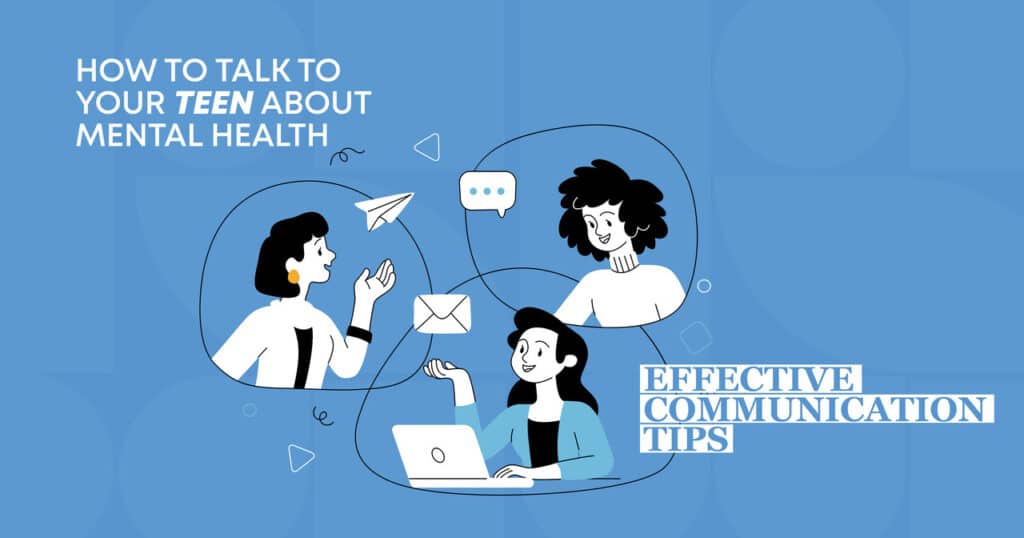Navigating the teenage years can be challenging for both parents and teens. With emotional ups and downs, social pressures, and academic demands, mental health challenges often become significant concerns. As a parent, you might find it difficult to approach the topic of mental health with your teen. This blog post will walk you through practical strategies for discussing mental health with your teen, making these discussions more manageable and meaningful.
Essential Takeaways
- Open Communication Builds Trust: Establishing a safe space for mental health conversations is crucial for effective discussions. Regular, empathetic, and non-judgmental interactions help teens feel supported.
- Active Listening and Empathy: Connect with your teen using active listening and empathy. These practices make them feel heard and validated, fostering a stronger relationship.
- Seek Professional Help When Needed: Recognize when it’s time to seek help from a mental health professional, especially if symptoms persist or worsen. Professionals can provide specialized support and resources.
Understanding Teen Mental Health
Why Mental Health Matters for Teens
Teenagers are at a crucial developmental stage where they learn about themselves and the world around them. Physical, emotional, and social changes mark this period, making mental health vital. It influences academic performance, relationships, and overall quality of life.
Good mental health helps teens navigate the complexities of adolescence, build resilience, and cope with life’s challenges. Addressing mental health concerns early can prevent more severe issues later on.
Common Mental Health Issues in Teens
Teens may experience a range of mental health disorders, including:
- Anxiety Disorders: Manifesting as excessive worry, panic attacks, or avoidance behaviors.
- Depression: Characterized by persistent sadness, irritability, and lack of interest in activities.
- Eating Disorders: Conditions influenced by societal pressures and body image concerns.
- ADHD: Affecting focus, organization, and impulse management.
- Self-Harm and Suicidal Thoughts: Issues requiring immediate attention and intervention.
Understanding these issues helps you approach conversations with empathy and awareness.
Creating a Safe Space for Conversation
Building Trust and Openness
- Be Non-Judgmental: Show openness to listening and understanding, not criticizing or lecturing.
- Show Empathy: Validate your teen’s feelings and experiences, letting them know it’s okay to feel how they do.
- Be Consistent: Regularly check in about their well-being, creating a routine of openness.
Choosing the Right Time and Place
- Find a Quiet Time: Avoid sensitive discussions during stressful moments.
- Create a Comfortable Setting: Choose a location where your teen feels relaxed, like a quiet room or during a shared activity.
- Be Mindful of Their Mood: Pay attention to your teen’s mood and energy levels.
Effective Communication Strategies
Active Listening Techniques
- Give Full Attention: Eliminate distractions, make eye contact, and show engagement.
- Reflect and Clarify: Repeat what your teen has said to ensure understanding.
- Avoid Interrupting: Let them finish their thoughts before you respond.
Using Empathy to Connect
- Acknowledge Their Feelings: Validate what they’re going through with phrases like “I can see how this would be tough for you.”
- Share Your Own Experiences: Normalize their feelings by sharing your own challenges.
- Be Patient: Allow them to open up at their own pace.
Asking Open-Ended Questions
- “How are you feeling about school this week?”
- “What’s been the hardest part of your day?”
- “Can you tell me more about what’s been bothering you lately?”
Addressing Common Challenges
Handling Denial or Defensiveness
- Stay Calm: Maintain composure if your teen is defensive.
- Avoid Pressuring Them: Let them know you’re there to listen when they’re ready.
- Use Positive Reinforcement: Acknowledge their efforts to communicate.
Navigating Emotional Responses
- Remain Supportive: Offer comfort and reassurance.
- Provide Space if Needed: Respect their need for a break from the conversation.
- Focus on Solutions Together: Explore coping strategies together when appropriate.
Knowing When to Seek Professional Help
- Persistent Symptoms: Seek help if symptoms persist or worsen.
- Risk of Harm: Immediate action is needed if thoughts of self-harm or suicide are expressed.
- Professional Guidance: A mental health professional can offer specialized support.
Encouraging Ongoing Dialogue
Regular Check-Ins
- Set Up Routine Conversations: Make discussions about mental health a normal part of your interactions.
- Be Proactive: Don’t wait for problems to arise; regular conversations normalize discussions.
Conclusion
Talking to your teen about mental health can be challenging but is crucial for their overall well-being. By creating a safe space, using effective communication strategies, and knowing when to seek professional help, you can support your teen through their mental health journey. Your willingness to engage in these conversations can make a significant difference in their lives.
FAQs
How can I start a conversation about mental health with my teen? Begin by choosing a calm, private setting. Express your concern with empathy and openness, encouraging your teen to share their feelings at their own pace.
What if my teen is reluctant to talk about their mental health? Respect their need for space but continue to offer support. Show that you can listen whenever they are ready to talk.
How can I support my teen’s mental health beyond our conversations? Encourage healthy habits, support participation in enjoyable activities, and help them access additional resources.
When should I consider professional counseling for my teen? Seek help if your teen’s mental health issues persist or if they express thoughts of self-harm or suicide.
What resources are available for teens struggling with mental health issues? Consider books, websites, local support groups, and helplines. Encourage your teen to seek guidance from mental health professionals.




